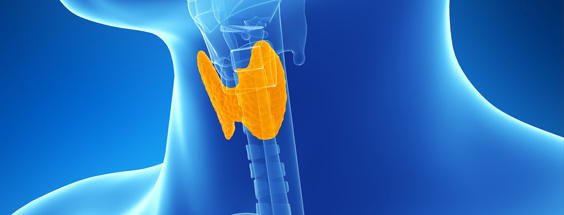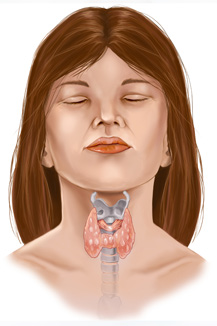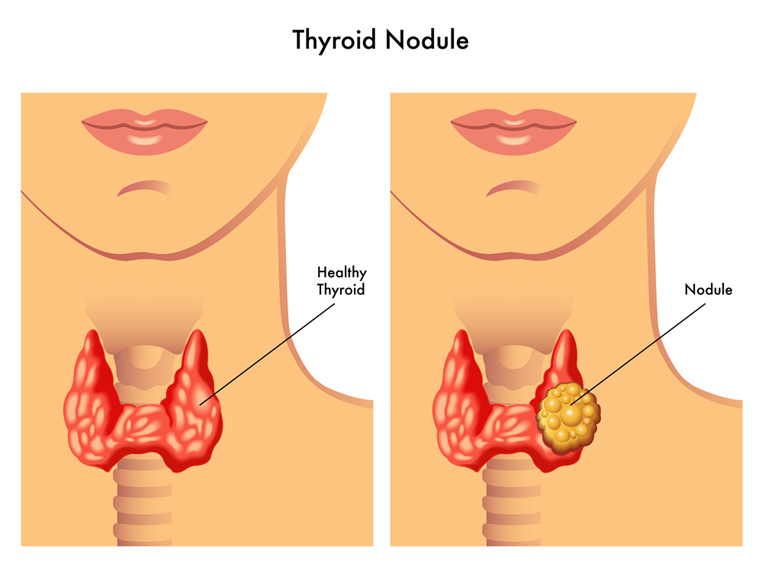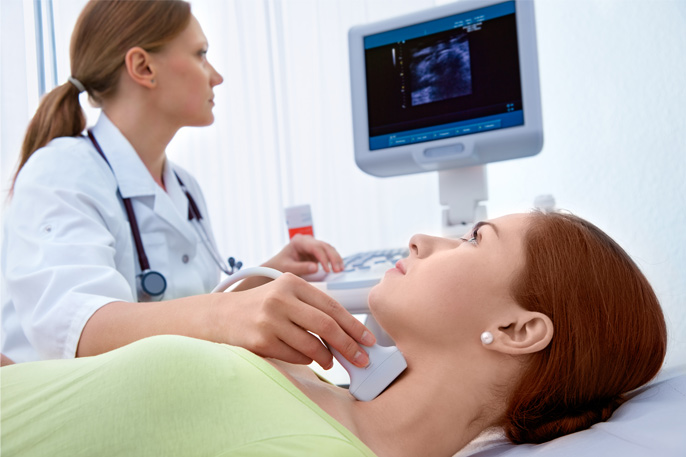
 The Thyroid is a butterfly-shaped gland located in the front of the neck. It releases hormones which impact on many aspects of our body’s function which could broadly be termed as “metabolism”. Problems with thyroid function are very common.
The Thyroid is a butterfly-shaped gland located in the front of the neck. It releases hormones which impact on many aspects of our body’s function which could broadly be termed as “metabolism”. Problems with thyroid function are very common.
Hypothyroidism refers to an underactive thyroid gland. It is usually due to “antibodies” (part of our immune system) which for reasons which we don’t fully understand turn against the thyroid and damage it to the degree that can no longer make enough thyroid hormone.
There are other less common causes. An underactive thyroid can present with a number of symptoms and the degree of symptoms are usually related to how underactive a thyroid is. The more underactive it is on the blood test the more likely it is that the symptoms are due to the thyroid. Symptoms include tiredness, weight gain, reduced concentration, constipation, reduced mood amongst others.
This is treated usually with a tablet consisting of a hormone which the body usually makes itself (Thyroxine/Eltroxin). The dose of the thyroid tablet is adjusted according to a blood test which informs us whether a person is on too much or too little Eltroxin. Occasionally, it can be difficult to regulate the thyroid blood test and further assessment may need to be undertaken.
Hyperthyroidism is the name given to an over-active thyroid gland. There are a number of different reasons why someone’s thyroid gland would become overactive. The most common causes would be Grave’s disease and nodular thyroid disease. Grave’s disease is more common in women and tends to occur at a younger age. It is caused by antibodies (part of the normal immune system) which target the thyroid gland and (opposite to Hypothyroidism) cause the thyroid to make too much thyroid hormone.
A thyroid can also become overactive if one or more (benign) nodules in the gland make too much thyroid hormone.

 Technetium scan showing overactive thyroid due to nodular thyroid.
Technetium scan showing overactive thyroid due to nodular thyroid.
The symptoms of an overactive thyroid include weight loss, palpitations, tremor (shake in the hands and/or legs), excessive sweating, heat intolerance (feeling very warm in a setting where you would not expect usually), difficulty sleeping, diarrhoea and anxiety. There can be many other symptoms and different people tend to have different symptoms. The symptoms of an overactive thyroid are broadly similar regardless of the cause but people with Grave’s can also sometimes have involvement of their eyes.
Treatment differs depending on whether or not the overactive thyroid is due to Graves or thyroid nodular disease. Treatment consists of tablets initially but other approaches including radioactive iodine and surgery may need to be considered in certain cases.
It is very common to have one or more nodules in a thyroid. They may be present in over 50% of a healthy population depending how aggressively they are checked. The vast majority of thyroid nodules are benign but some can be malignant (cancerous). A nodule may present with a noticeable swelling in the neck, pain in the neck or other symptoms.

Sometimes nodules are picked up on a scan of the neck (or even lungs) done for another reason. If nodules are greater than a certain size it is important that they are investigated to exclude malignancy. Investigation consists of bloods tests, ultrasound scanning of the neck and sometimes a sample taken with a small needle.

If a nodule is found to be malignant or if there is a high degree of suspicion it may be recommended that part or all of the thyroid gland is removed. Thyroid cancers are subsequently treated with “Radioactive Iodine” - a very specific treatment for thyroid cancer which is usually very effective. Most cases of thyroid cancer which are detected early have an excellent prognosis.

It is important to state that the vast majority of nodules turn out to be benign. Such nodules may however need regular monitoring with annual sampling and ultrasound scanning until sufficient reassurance can be obtained from the results.